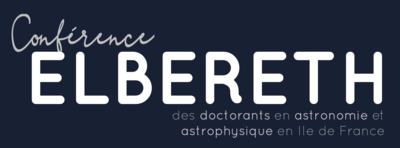Orateur
Description
Direct imaging of exoplanets will facilitate the search for habitable worlds by enabling the generalized characterization of their atmospheres. High-contrast imaging instruments equipped with coronagraphs suppress starlight, allowing the detection of faint exoplanetary companions. However, optical aberrations introduce starlight residuals (speckles) that hinder the detection performance in the coronagraphic image. High-precision focal plane wavefront control methods utilize deformable mirrors guided by focal plane aberration estimation to minimize the intensity of the speckles. Current methods rely on imperfect physical models of the instruments, limiting correction accuracy to a few nanometers, falling short of the sub-nanometer precision demanded for Earth-like exoplanet detection. This thesis investigates the potential of deep learning to surpass current limitations in focal plane wavefront control. Specifically, we explore the application of model-free reinforcement learning to circumvent the need for physical models. In this presentation, we will show initial training on a simpler non-coronagraphic active optics problem in simulations which lays the foundation for future exoplanet imaging applications.
Day constraints
Friday March 1st
| Astrophysics Field | Instrumentation |
|---|

